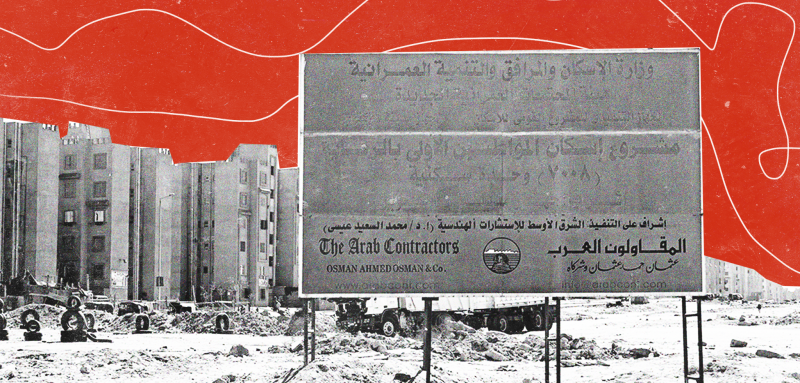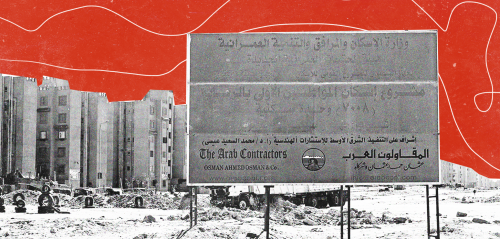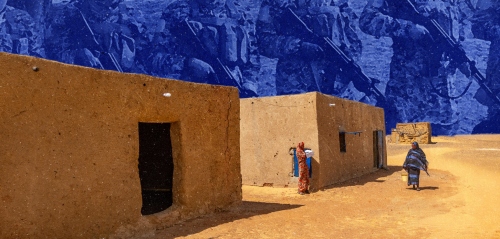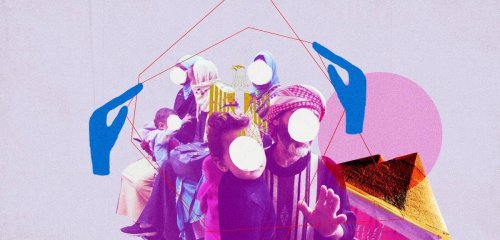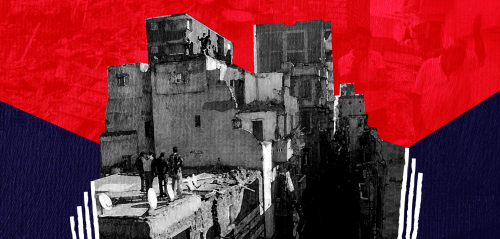On the outskirts of the sixth district of the 6th of October City, southwest of Cairo, thousands of people of different nationalities reside. They have nothing in common with the "citizens" of the country who live with them in the same residential area, except for poverty, marginalization, bullying, and hatred, all of which await to explode at every opportunity.
Masaken Osman, which are currently remote residences that lack services, were previously allocated by the Egyptian government to house groups it considered to be the "most favored" (or the “Awla bi-l-Ri`āya”) at low prices suitable for low-income people. The neighborhood was originally intended to be a solution to an incessant housing shortage, but over the years, it has turned into a home for transients and a refuge for slum dwellers.
Despite its harshness and dangerous social structure, the area, locally known as "al-Masaken", continues to regularly receive victims of the demolition carried out by the state in some old residential areas that it classified as slums or dilapidated areas prone to fall, along with the residents of areas that the government has considered to be of high investment value, displacing its residents in favor of housing projects that it plans to sell for millions.
This is the main composition of Egyptians in the Masaken Osman area, before they were joined in the past ten years by statistically uncounted numbers of refugees and asylum seekers, the majority of whom are Syrians, Sudanese, Somalis, and Eritreans.
The most recent assault on refugees in Egypt occured in Masaken Osman, when residents tied two Sudanese boys to a lamppost, then beat and insulted them with racial slurs, before handing them over to police for alleged theft, who detained them for two days
Masaken Osman: The origin story
The Masaken Osman project began based on the Tadamun initiative, which is concerned with urban planning, in October 2005 as part of the National Housing Project meant to provide 500,000 housing units, with an area of 42 square meters, to serve low-income people in Egypt. In its description of the project, the Ministry of Housing ambiguous defined the eligible citizens, or the “Awla bi-l-Ri`āya” ("the most favored"), as “citizens most in need, who would be unable to make down payments”, for the plan, the implementation of which was assigned to the Arab Contractors Company - (Osman Ahmed Osman & Co), and for this reason the residents called the housing project "Masaken Osman".
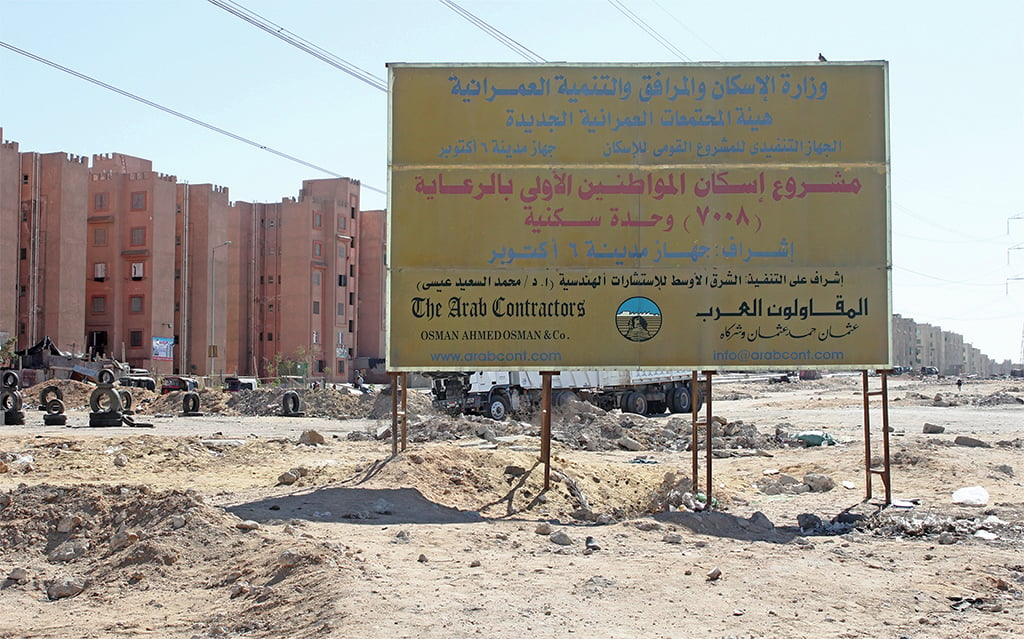
An old shelter for residents of Duwaiqa
The project was originally intended to provide affordable housing for people with very low incomes, but the collapse of a 3,000-tonne chunk of rock in the Manshiyet Nasser neighborhood in Duwaiqa district, west of Cairo, in 2008, which crushed houses and resulted in the deaths of 119 citizens, prompted the government to house residents living in the vicinity of Duwaiqa as well as others living in unsafe areas of Cairo within the 6th of October City's residences.
Some of the residents of Duwaiqa did not fit in with the nature of the area, as access to it requires moving between more than one means of transportation, since it is located 20 kilometers west of Cairo, in addition to its lack of public services. In addition, the city isolated them from their sources of livelihood, which were dependent on trade. So they left the site and were replaced by some others who rented the apartments at low prices that did not exceed 300 Egyptian pounds.
Thus, the area seemed difficult to live in, with few services and almost no job opportunities, attracting a segment of people who were unable to find other affordable housing in Cairo and Giza. At the forefront of this segment are Arab and African refugees who have not found another refuge better than a site overlooking cemeteries. In it, crime is rampant, so much so that the name of the area on Google has become associated with a den for crime, drug trafficking, and the abuse of refugees.
"No one can harm the Sudanese", said Mohamed Ali, an Egyptian driver, when we spoke of the complaints of the Sudanese residents, "If one of them is harmed, they will all come, and he'll find a thousand to back him up. Numbers beat courage, and they are many"
Refugees... The weakest link
The latest incident of assault on refugees witnessed a new chapter the day before yesterday, on the morning of Monday, December 12, with the release of two Sudanese children, who were detained by the security forces for days after a decision was issued by the Public Prosecution to release them. The decision came after it was proven that they had been falsely accused of theft, but no charges were brought against those who had assaulted them, by beating and torturing them, as well as accusing them of committing crimes that require imprisonment.
The incident began when a group of residents of the area assaulted two Sudanese children, who were asylum seekers residing in Masaken Osman. The residents tied them to a lamppost, just because they were suspicious of why they were there, assuming they were walking there in order to plan a robbery. After a lengthy period of physical assault and racist verbal insults, the aggressors handed the children over to the police, before a decision was issued by the prosecution on Thursday evening to release them on Monday morning, according to Nour Khalil, executive director of the Refugees' Platform in Egypt.
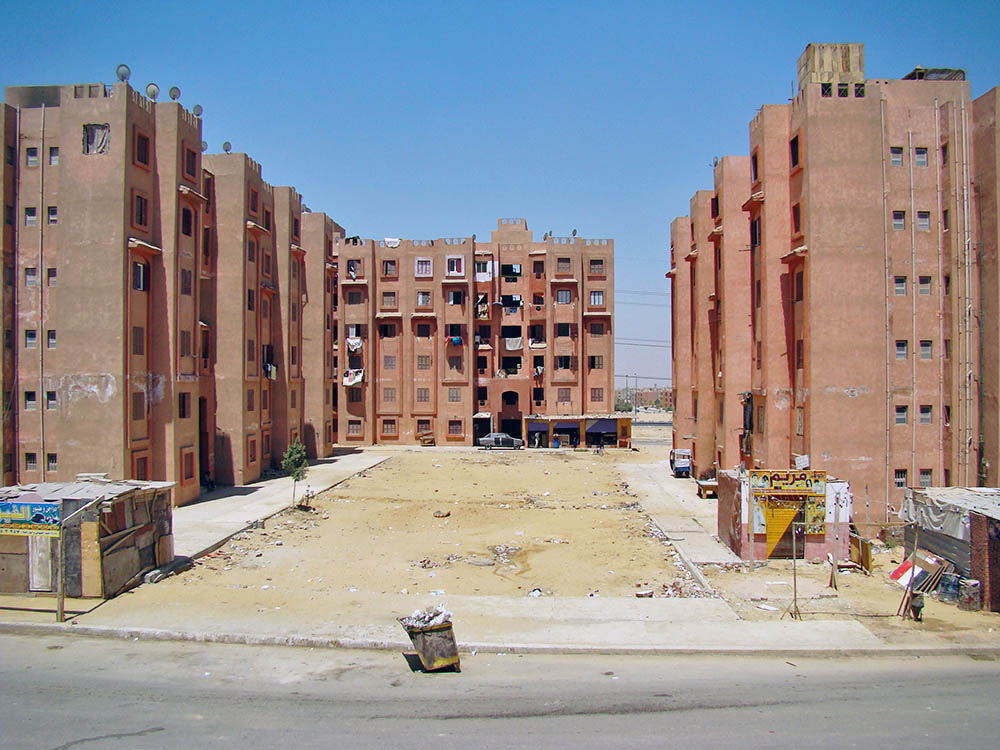
The Refugees' Platform in Egypt, an independent organization that works to defend human rights, as well as support and advocate for transient people on the move, quoted the testimonies of the families of the two children, saying that the reason they were in this area was their work in cleaning new buildings. However, the attackers did not investigate the matter and detained them under threat and beatings, after tying them to an electric pole in front of everyone.
Khalil explains to Raseef22 that the police charged the two children with attempted theft, then presented them to the Public Prosecution, which in turn decided to detain them for four days, before referring the case file to the Children's Prosecution, which decided to release them. He confirmed that they were back with their families on the morning of Tuesday, December 13.
Repeated attacks
This is not the first violent incident practiced against Sudanese refugees and people of color in this region. A few meters away from this latest incident, another Sudanese child, Mohamed Hassan, was killed inside his house. An elderly Egyptian man stabbed him because of a financial dispute with his father, in October 2020. The incident sparked major protests from the Sudanese residents of the city, prompting security forces to fire tear gas to disperse them and also prevent his father from holding his funeral.
According to Nour Khalil, Masaken Osman is one of the areas with the highest number of racist violations and physical attacks against refugees.
However, the ongoing attacks against refugees — especially those of black African descent — in Masaken Osman cannot be separated from these refugees being exposed to racist practices at the hands of Egyptian citizens with no power or authority, or at the hands of the security authorities themselves, as happened in an incident recorded by the Refugees' Platform and Human Rights Watch, when a security service detained Sudanese residents and refugees, and forced them to work long hours without pay under torture, before throwing them into a desert area.
This isn't the first incident against people of color in Masaken Osman, which the Refugees' Platform director says has the highest number of attacks against refugees. Meters away from where two Sudanese children were assaulted, another child was stabbed to death
Here are Masaken Osman.. An Economic Reality in Crisis
Following the racist assault, only hours before the two children were released, Raseef22 toured the Masaken Osman area in the 6th of October City, to learn about the impact of the incident on the relationship between the Egyptian residents of the area and the refugees.
On the ground, the difficult economic reality that Egyptians share with their guests imposes itself on daily life. Men and women engage in simple trade, and young men gather inside small cafes watching World Cup matches to kill time.
One can also notice teenagers occupying the empty squares between buildings, to hold football matches involving Egyptians and Sudanese participants, in a scene that indicates the fading effects of the recent painful incidents.
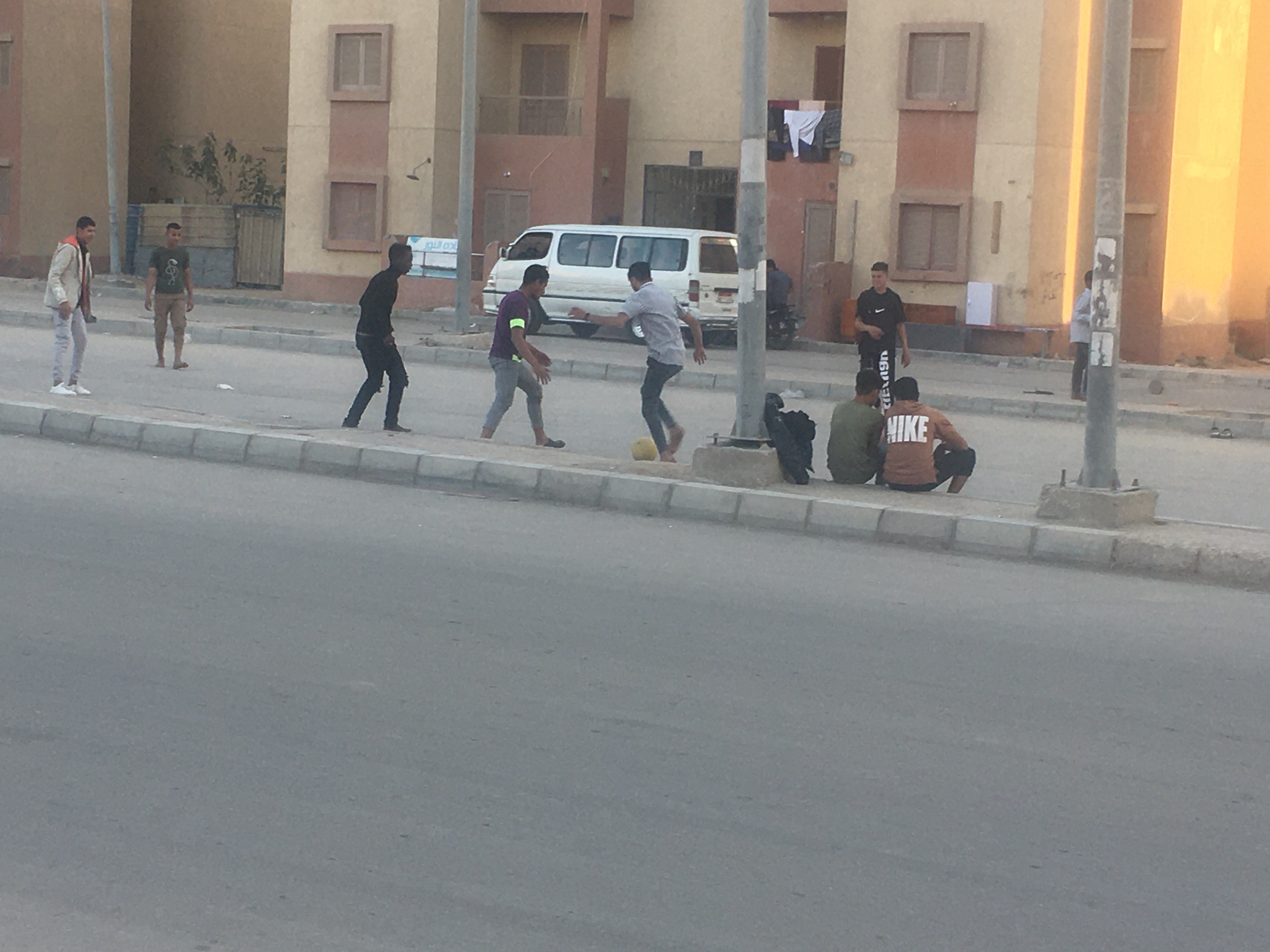
Mohamed Ibrahim, a Sudanese refugee living in the area, tells Raseef22, "Fights and disputes between the people of the same country as well as those of same religion are common anywhere, and even between people who are not from your country, but they are abound here in Masaken Osman because it is a difficult place where the poor from different parts of the country meet."
Ibrahim arrived in Egypt seven years ago, spending most of it in Masaken Osman, after fleeing the bloody conflicts in the Darfur region, which made it easier for him to obtain asylum in Egypt.
Ibrahim does not work regularly, as he does not work in a specific profession that generates a fixed income, in addition to the monthly allowance he receives from the UNHCR, but from time to time, he is forced work for 12 continuous hours in the factory area near Masaken Osman, for a fee of no more than 120 Egyptian pounds.
Reports by the UNHCR indicate that many refugees struggle to provide food for their families, send their children to school, and keep a roof over their head. Many find themselves mired in debt and trapped in poverty, having to follow desperate coping mechanisms to survive, such as child labour, early marriage, or living on the streets.
The number of Sudanese residing in Egypt, according to UNHCR, is between one and four million people, of whom only about 52,000 were registered as refugees or asylum seekers. Egypt officially hosts more than 271,000 refugees and asylum seekers from 65 countries
Ibrahim points out that many Sudanese refugees suffer from poverty, which has prompted them to live in a remote area such as Masaken Osman, where the rent ranges between 500 and 600 Egyptian pounds. He says that they chose to ignore the level of services and the lack of job opportunities, likening their situation to that of many Egyptians, as it is a harsh environment where illiterate and low-income people gather, so it is no wonder that disputes and fights break out on a constant basis.
The forty-something man mentions that the reports of physical violence and robberies that reach the press are only a small sample of what is actually happening in the region. According to Ibrahim, these incidents are repeated on a daily basis in the absence of police — despite the presence of a police station in the area — for reasons he attributed to the declining cultural level and social composition of the region.
Osman Mohammad, a young man in his mid-twenties, stood only meters away watching a heated match between Sudanese players in a game of dominoes, on his way from his work in the factory area.
Mohammad's family settled in Egypt 10 years ago, during which they moved between many popular areas, until they settled in Masaken Osman, one of the large Sudanese communities in Greater Cairo.
Mohammad informed me that he had heard of the incident where two children were assaulted in the Abnaa al-Jizah area, but he did not have much of a reaction, since it was a recurring incident. He points out that he is sometimes bullied because of the color of his skin, but it doesn't reach the level of physical assault.
During our tour of the region, it was evident that there was a noticeable commercial activity by the Sudanese residents, as many of them have established private businesses, most notably restaurants that serve Sudanese food, cafes, and barbershops, whose customers are Sudanese.
Omar Younes came to Egypt two years ago, amidst the wave of Sudanese displacement following the downfall of the Bashir regime, and the deteriorating security and economic conditions, for Egypt has become the first destination for many of them due to its geographical proximity and being known for sheltering many refugees.
Younes has been good at cooking since he was in Khartoum, and with his need for a source of income to help him stay, he opened a restaurant and café that serves popular Sudanese food. He says, "The economic situation is difficult in Sudan and Egypt, but here at least there is security."
Younis fears that his shop will be demolished in light of the wave of demolitions that have impacted many Sudanese and Egyptian shops. These shops were randomly and illegally built by residents under their buildings, where traces of the demolitions of some shops are noticeable, "I do not have the authority to object. I am just an asylum seeker and I do not have a work permit, and the government says that [the shop] is in violation, so there is no room for objection so as not to further stir up an already bad situation."
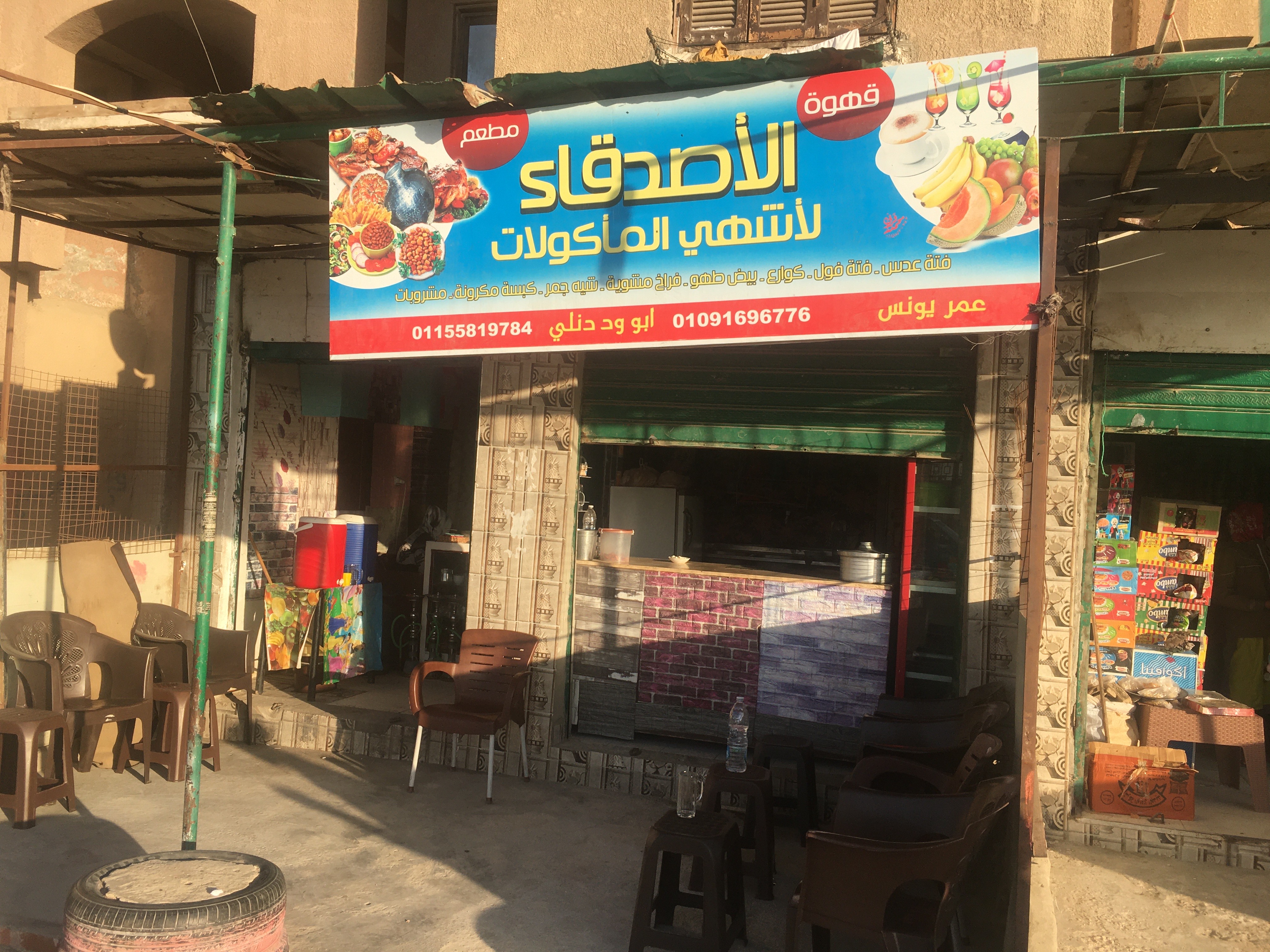
Between living in exile and reality
"No one can harm the Sudanese [residents]". This is how Mohamed Ali, an Egyptian driver who transports the residents of the area to the Sixth District, the densest neighborhood of the 6th of October, replied when I confronted him with what the Sudanese were complaining about. He then says, "If one Sudanese is hit, all of them will come, and he'll find a thousand to back him up. Numbers beat courage, and they are many".
Ali describes the "al-Masaken" as a "land of wonder", where people of different nationalities come together with identities and social backgrounds that cannot, in his opinion, merge under one roof or umbrella. His family lived a large part of their lives in the Manshiyet Nasser Masaken and Duwaiqa residences, west of Cairo, before the government rehoused them in the residences of Masaken Osman after the Duwaiqa rock collapse in 2008.
The 30-year-old man does not feel distressed by his area overcrowding with Sudanese residents, since it is a transient homeland for all, and many others end up in it. However he did not hide his thoughts about the good life he believes they have, through obtaining a lot of money from NGOs and the UNHCR, in addition to their noticeable commercial activity in the region, which Ashraf Milad, a lawyer specializing in refugee affairs, denies.
Sudanese immigration
Many Sudanese have been forced to immigrate to Egypt in recent years due to security and political instability in their country. In Egypt, despite poor economic conditions and their struggle to live, they are still able to obtain benefits close to those with citizenship have, in terms of enrolling in schools and access to health services, according to lawyer Ashraf Milad.
The lawyer who specializes in refugee affairs explains to Raseef22 that up until 2004, Sudanese people used to come from the Darfur region as a result of conflicts and migrations inside and outside the continent. However in past years, refugees and asylum seekers from the opposition in northern Sudan began coming to Egypt. Milad then proceeds to point out that there are many of them whose asylum applications were rejected by UNHCR, due to the lack of sufficient reasons to accept their application.
According to UNHCR, which records and documents cases of asylum seekers and refugees on behalf of the Egyptian government, the number of Sudanese residing in Egypt is estimated to be between one and four million, of whom only about 52,000 are officially registered as refugees or asylum seekers. Egypt hosts more than 271,000 refugees and asylum seekers from 65 countries.
Hate crimes or attacks over livelihoods?
According to Milad, the Sudanese are spread in five areas that witness frequent attacks, namely Hadayek El-Maadi, Al-Alf Maskan, Ain Shams, Ard El-Lewa and Masaken Osman, by virtue of being popular areas where unemployment rates increase. He indicates that Masaken Osman is the poorest compared to the other areas, where the value of the rent does not exceed 600 Egyptian pounds, which is a small amount compared to the Faisal area, where the rent reaches 1,000 pounds and is at least 2,000 pounds in Hadayek El-Maadi.
Milad does not consider the crimes that take place against the Sudanese community within the framework of hate crimes and racism, as there are no organized groups that adopt this, and are rather crimes motivated primarily by unemployment. He says that most incidents involving assault take place out of jealousy over their long work hours and opening businesses like bakeries, barber shops, and cafes, and some of them even own tok tok taxis that compete with Egyptians in these fields.
The prevailing impression among a group of Egyptians states that the Sudanese community collects a lot of money from organizations that support refugees, but lawyer Ashraf Milad points out that aid has decreased a lot in the recent period, as one family consisting of five members receives only about 2,000 pounds, which barely covers rent, while in previous times, they used to get good sums. Now with the high cost of living in Egypt and increasing inflation, everyone is suffering.
Nour Khalil, executive director of the Refugees' Platform in Egypt, agrees with Milad regarding the reasons for the spread of crimes in popular areas teeming with refugees, stressing that the economic factor plays a major role in the practice of violent behavior, in addition to the absence of laws that protect refugees.
Although he does not believe that the street is affected by such campaigns, Milad compares these attacks with the ones that affected the Syrian community in earlier times. He explains that Syrians suffered in Egypt in the aftermath of the June 30 revolution after being accused of participating in marches in support of the Muslim Brotherhood, and were demonized in the media by some journalists and media professionals. This was repeated in recent times with the Sudanese refugees in the country following talk of whether the disputed territory of Halayeb and Shalateen was Sudanese and differences with the political regimes that ruled in Sudan.
With the increasing incidents of attacks against refugees, Nour Khalil, the executive director of the Refugees' Platform in Egypt, calls for researchers, civil society organizations, and volunteer groups to be allowed to work in such areas without restriction, in order to study in depth and propose appropriate solutions to policies and practices. He also called on security authorities to allow victims to report and investigate similar incidents, and to provide pathways to justice and litigation.
Raseef22 is a not for profit entity. Our focus is on quality journalism. Every contribution to the NasRaseef membership goes directly towards journalism production. We stand independent, not accepting corporate sponsorships, sponsored content or political funding.
Support our mission to keep Raseef22 available to all readers by clicking here!
Interested in writing with us? Check our pitch process here!
